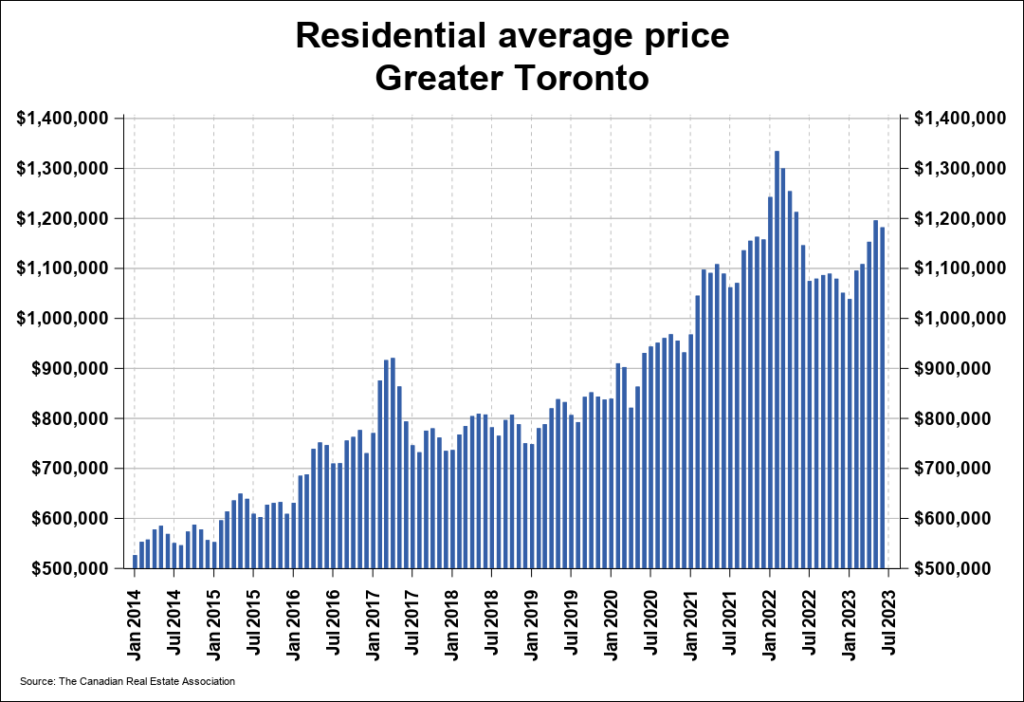Toronto, ON real estate market outlook 2023
We sat down with our realtor partner Martha Grakovski to give us an outlook on the Toronto real estate market for 2023.
If you’re looking to buy a home in Toronto, you can contact Martha via email here: Marthagrakovski@gmail.com
Key Takeaways
- The average selling price of a home in Toronto is $1,182,120 as of June 2023.
- The average price of a home is up 3.2% year over year in June of 2023.
- The average number of days a property is on the market is 19, down from 24 in June of 2022.
Did the Toronto real estate market crash in 2023?
The Toronto real estate market has undergone quite the journey from 2022 to 2023, defying expectations in several ways. The ongoing series of interest rate hikes, began in 2022 and have persisted into the summer of 2023, has had significant impact. Surprisingly, despite concerns of a potential crash or bubble pop, the market has not experienced a decline of that description. It’s been interesting to see how the market has been responding.
The beginning of 2022 had an unsustainable surge in property prices. The Bank of Canada, in order to curb rapid inflation, had implemented 8 consecutive interest rate hikes in 2022. This led to a “correction” in prices that brought everything back down to a more stable level. The most notable change has been in the volume of sales, while property prices have remained relatively stable due to the limited inventory levels.

As of June 2023, the average price of a home in Toronto was $1,182,120. This is a 3.2% increase from June of 2022, but a 1.2% drop from May of 2023.
Source: The Canadian Real Estate Association
How have interest rate hikes from the Bank of Canada affected the market in Toronto?
The impact of the interest rate hikes have aligned with the intended goal of slowing down the pace of the real estate market and inflation in general. In some neighbourhoods, prices had even dropped by 25% year over year by winter 2022. The higher interest rates have deterred some potential buyers as they were consistently rising, leaving some people uncertain about the fate of the Toronto real estate market.
There is however another factor to consider: The baby boomer generation is very relevant to Canadian real estate because of the amount of housing they hold. With little to no mortgage left on their property, inventory did not rise as quickly as some predicted. Low inventory keeps the market from “crashing”. The interesting part was after multiple consecutive announcements of interest rate hikes, once the Bank of Canada put its first pause on increasing rates further, it was a surprise to some to see how quickly the demand went up again. This spring market was back in full effect, commonly seeing multiple offers and properties selling in less than a week.

Would you say interest rates are the biggest factor affecting the Toronto market?
Interest rates are and have always been a huge factor in the real estate market. One of the biggest factors at play is simply supply versus demand. We have a generational accumulation of low inventory due to the lack of development lands, low construction rates, zoning regulations, and a huge demand! According to the Canadian government, Canada will be welcoming around 480,000 immigrants per year. These educated immigrants will be flocking to areas with the most job opportunities- the big cities like Toronto. In addition to this, the benefits of investing in Toronto are now so well known that there has become a notable surge in the number of individuals and small businesses purchasing multiple properties.
Which way do you see prices going in the future?
In the short term, inventory is rising a little and prices are softening a touch after the spring market and that may continue if interest rate hikes continue.
If anyone is predicting a true buyer’s market, they need to better understand all the factors driving the market. No one can predict the future however while we see the demand for housing rise, the supply of available housing does not always keep up. In the long run, I can see more individuals competing for a limited number of homes in Toronto, which causes an increase in selling prices. If income growth does not keep up with rising housing costs, individuals and families may struggle to afford a home.
What advice would you give to someone thinking about buying their first home in Toronto?
I would have different advice for an investor versus an end user. If someone is looking to purchase a home to live in or rent out, I would say don’t focus so much on trying to “time the market”. Time in the market is far more important than trying to buy “a deal”. The price of housing will almost always increase over a 5 or 10 year scope. Look at numbers, make sure you properly understand the monthly carrying costs of a home including your mortgage, taxes, maintenance fees etc and buy in the price range you can afford. Work with a skilled Realtor that understands market knowledge, that you trust to properly guide you through one of your most important financial decisions.
Check out our interest rate forecast for an up to date outlook on the mortgage market, including where our analysts predict rates will go over the next 5 years.







